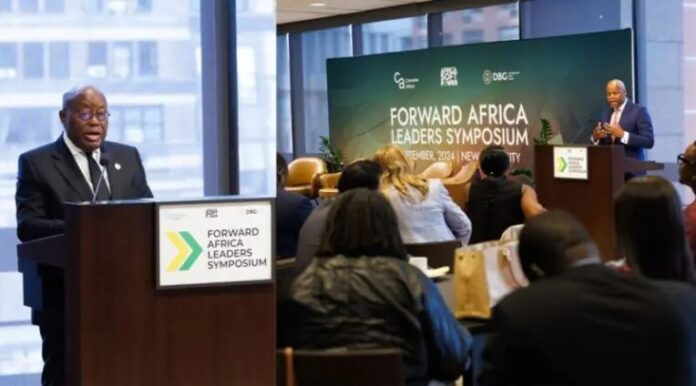President Akufo-Addo has reiterated the need to build digital infrastructure across Africa to spur financial inclusion and cross-border trading.
According to the president, this will be one of the surest ways of effectively rolling out the African Continental Free Trade Area which aims to create a market of 1.3 billion people with a combined GDP of an estimated US$ 3.4 trillion.
Ghana which hosts the headquarters of the African Continental Free Trade Area (AfCFTA) is amongst the list of a few African countries running a guided Trade Initiative – deemed to be a precursor to a major rollout of the biggest trade area which will allow free movement of goods and services amongst African countries.
However, On the Margins of the 79th United Nations General Assembly in New York, Convene Africa-Organizers of the Forward Africa leader’s symposium, reassembled key actors in Africa to dialogue on moving the conversations forward on Africa’s digital economy.
The forum brought to the fore, questions around the effective implementation of the African Continental Free Trade Area in the wake of the African Union’s adoption of a protocol on digital trade.
In his view, President Akufo-Addo noted that “for the AfCFTA to succeed, we must all commit to building the digital infrastructure that will support the transformation.”
“Ladies and gentlemen, as we move forward, central banks and regulators will play a crucial and increasingly crucial role in shaping the future of our digital economy. It is not simply enough to regulate the financial sector. We must actively support its digital transformation.
“This means making sure that digital payment systems are interoperable across borders, allowing for seamless financial transactions between nations. It means creating the right regulatory frameworks that protect consumers while encouraging innovation.”
Secretary General of the African Continental Free Trade Area (AfCFTA) Secretariat Wamkele Mene while taking his turn to address the gathering indicated that the latest protocol on digital trade has created an environment where data in Africa can be commercialized.
Speaking at the Forward Africa leader’s symposium organized on the margins of the 79th United Nations General Assembly, the chief scribe of Africa’s biggest trade agreement bemoaned how many Blue chip companies outside of Africa have taken advantage of Africa’s digital market leaving many indigenous firms behind.
However, with the adoption of a protocol on digital trade by the African Union, Wamkele Mene says African companies now rely on the regulatory framework to create Africa’s own digital market.
“And for the AfCFT to succeed, we must all commit to building the digital infrastructure that will support the transformation. Ladies and gentlemen, as we move forward, central banks and regulators will play a crucial and increasingly crucial role in shaping the future of our digital economy. It is not simply enough to regulate the financial sector. We must actively support its digital transformation.”
“This means making sure that digital payment systems are interoperable across borders, allowing for seamless financial transactions between nations. It means creating the right regulatory frameworks that protect consumers while encouraging innovation.”
In a bid to give a further boost to Intra- Africa Trade the African Continental Free Trade Area Secretariat is scheduled to host the Biashara Africa Business forum in Kigali-Rwanda from 9-11 October 2024 which will bring together industry leaders, policymakers, and entrepreneurs to drive the future of Africa’s trade landscape.


